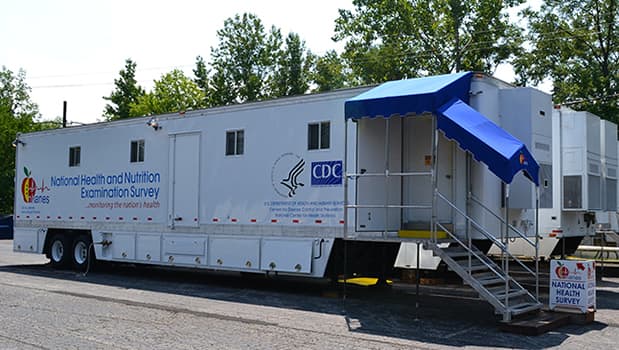
The National Health and Nutrition Examination Survey (NHANES), one of the largest and longest-running surveys of America’s health and nutritional status, established an outpost on UNC Charlotte’s campus this summer. NHANES field teams conducted more than 300 in-home interviews across the area, and about the same number visited the mobile examination center on campus for a comprehensive physical exam.
College of Health and Human Services Dean Nancy Fey-Yensan worked with numerous UNC Charlotte divisions to secure the space and resources for the NHANES mobile center. She said the data the survey collects are “like gold” to CHHS researchers.
“NHANES has been and continues to be absolutely essential in yielding scientifically derived, foundational data that is used to identify the health care needs of a rapidly changing population in the U.S. It is the most comprehensive, valid and reliable health data set in America,” said Fey-Yensan. “The data set is accessible to our researchers who can look at it and examine current population health trends and ask, and importantly, answer, the most salient health questions for the populations we serve.”
Participants for NHANES surveys are randomly selected, interviewed at home and then visit the mobile health center for a thorough examination. The interview includes questions on topics like demographics, socioeconomic status and diet. The physical exam consists of a battery of medical, dental and physiological tests. Findings are used to look at the prevalence of and risk factors for major diseases and inform a wide range of health and nutrition outreach programs.
George Zipf, operations branch chief for NHANES, said the program is a robust source of information for researchers and policy makers.
“The richness of the data on any one survey participant combined with the fact that NHANES has collected this data on roughly 80,000 survey participants since 1999 makes NHANES a national data treasure,” he added.
Securing survey participants is a challenge for NHANES. Though participants are paid for their time, Zipf noted. “People are busy and sometimes wary of being in a survey. We understand the reasons for non-participation, and so we always seek the support of public institutions to give us additional legitimacy,” he said.
Mecklenburg was among 15 counties selected as a survey location this year. Marcus Plescia, health director of the Mecklenburg County Health Department, helped bring the program to UNC Charlotte’s campus.
Plescia lauded the relationship between the health department and CHHS, calling it “vital for successfully addressing major projects and in ongoing collaborations,” such as joint grant applications and internships.
Fey-Yensan agreed, stating the relationship was pivotal in connecting NHANES with the University and the college. She noted UNC Charlotte and NHANES are common sense colleagues, in that for NHANES, “having partners who understand the complexities of research protocols, data security and client confidentiality is important to achieving their goals and producing quality results.”
The National Institutes of Health, Food and Drug Administration and Centers for Disease Control and Prevention are among those organizations that rely on NHANES data to shape their activities.
Program findings have been the basis of significant public health interventions. In the 1970s, high levels of blood lead in NHANES participants convinced lawmakers to eliminate the heavy metal from gasoline and soft drink cans. More recently, figures on the prevalence of weight issues nationwide have driven outreach and educational programs encouraging exercise and a healthy diet. Researchers also are combing NHANES data to better understand why rates of cardiovascular disease are falling.